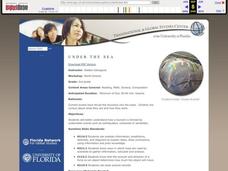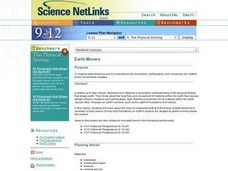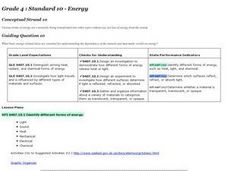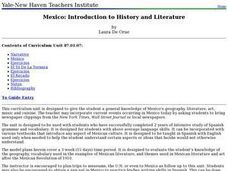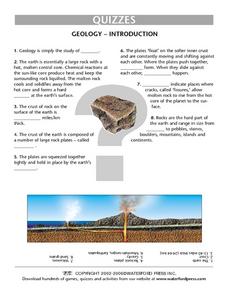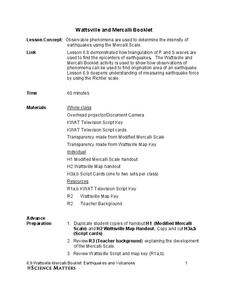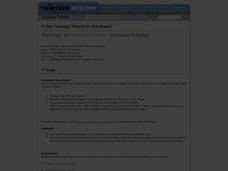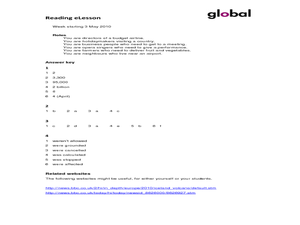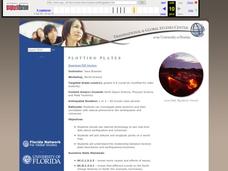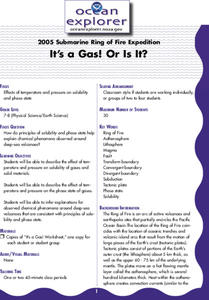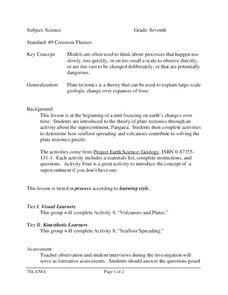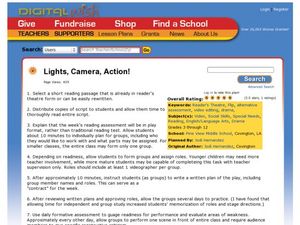Curated OER
Under The Sea
Second graders study how a tsunami is formed by underwater events such as earthquakes, volcanoes or landslides. They discuss what they knew about living and non-living things in the ocean.
Curated OER
Pass the Plate
Young scholars define constructive forces. They describe how landforms are created as a result of constructive forces. Students recognize active volcano areas in the United States. They demonstrate an understanding of Panagea.
Curated OER
Buddy, Are You Ready?-Preparing for School Emergencies
Students explore natural disasters by reading stories about volcanoes, earthquakes, floods, and hurricanes. They explore safe behaviors in order to understand what to expect in a catastrophe. Students practice safe evacuation procedures...
Curated OER
Personal Written Response Activity
Pupils complete a final written project. In this personal response lesson, students respond in a creative way to one of the issues presented in the unit. Pupils may choose to create a series of postcards from a natural disaster,...
Curated OER
Volcanism (part 1 of 3)
Learners explore the factors that control magma viscosity and study about the characteristics of volcanic eruptions. Lesson describes collaborative group exercises and guided inquiry methods.
Curated OER
Mountains: A Drama Exploration
Students dramatize the formation of mountains. In this earth formation dramatization lesson, students read Anne Issacs', Swamp Angel, and research the how the layers of the Earth move to form landforms. They work in groups to dramatize...
Cornell University
Constructing and Visualizing Topographic Profiles
Militaries throughout history have used topography information to plan strategies, yet many pupils today don't understand it. Scholars use Legos and a contour gauge to understand how to construct and visualize topographic profiles. This...
Curated OER
Earth Movers
High schoolers read an online article about an earthquake and follow up with a series of discussion questions about earthquakes. They answer questions in their science journals about continental drift, plate tetonics, and their...
Curated OER
The Dynamic Earth
Students use the Internet to investigate earthquakes and plate tectonics. In this plate tectonics instructional activity, students complete a web quest with multiple links and activity types relating to earthquakes and volcanoes. They...
Curated OER
How Islands Form
Pupils how islands form, rising water levels, growth of coral, and volcanoes. They complete Island Investigation worksheets after researching island formation on various Internet websites.
Curated OER
Energy
Students see that energy is everywhere in nature - in the light of the sun, in wind, in falling water and erupting volcanoes. Without energy, there is no life. This lesson plan provides many good ideas across the curriculum to study energy.
Curated OER
Mexico: Introduction to History and Literature
Students study the geography of Mexico (i.e. major cities, surrounding countries and bodies of water, mountain ranges, rivers, volcanoes), They take turns reading aloud information provided (xerox copies) about Mexico. After each...
Curated OER
The Great Continental Drift Mystery
Students stud the concept of Pangaea by using Wegener's clues to construct a map of the continents joined together. They determine how fossil distribution can be used to enhance the study of continental drift. They locate the...
Curated OER
Introduction to Geology Quiz Worksheet
For this earth science fill-in-the-blank worksheet students complete 8 questions about an geology. They see a picture of a rock and a volcano on the page. They check their work with the word bank at the bottom of the page.
Science Matters
Earthquake Waves: Wave Notes
A multi-part instructional activity opens with a review of p waves and s waves. Then scholars use a simple s wave simulator to view the way the wave travels. Next, pupils use cups and various fluids to simulate p waves moving...
Science Matters
Wattsville and Mercalli Booklet
There has been an earthquake! Can you listen to the description of damage given by callers in order to determine the epicenter? The 11th of 20 lessons has pupils read a script of one emergency caller. The class records the information on...
Curated OER
Climate Change: Is there a Controversy
Students explore climate changes. For this climate changes lesson, students research what causes changes. Students search the Internet, summarize reports they find and create a poster with the information.
Curated OER
Our Savage Planet in the News
Students explore extreme earth phenomenons. In this savage planet lesson, students explore and report on various types of severe weather and earth phenomenons using the Internet, a word processor, or other multimedia device.
Curated OER
You're Grounded!
Students explore the Iceland volcanic eruption that halted European transportation in 2010. In this transportation lesson plan, students read an article about the event and then discuss the impact of the event. Extension activity...
Curated OER
Plotting Plates
Learners investigate plate tectonics and their correlation with natural phenomena like earthquakes and volcanoes. They use the internet to see real-time data about earthquakes and volcanoes. Students plot latitude and longitude points on...
Curated OER
It's a Gas! Or is it?
Young scholars discover the principles of solubility and phase state and their influence on chemical phenomena observed around deep-sea volcanoes. They describe the effect of temperature and pressure on solubility of gasses and solid...
Curated OER
Science
Seventh graders study the theory of plate tectonics. In this activity lesson students complete an activity to determine how seafloor spreading and volcanoes contribute to solving the plate tectonics...
Curated OER
Lights, Camera, Action!
Learners add various types of multimedia to a website they have created about volcanoes. They review what would best enhance their website and determine what the value and cost be in adding that particular piece of multimedia.
Curated OER
Water 1: Water and Ice
Students explore the states of water. In this science lesson, students use observation, measurement, and communication skills to describe water as it changes from a solid to a liquid.
Other popular searches
- Types of Volcanoes
- Volcanoes and Earthquakes
- Shield Volcanoes
- Erupting Volcanoes
- Science Project Volcano
- Composite Volcanoes
- Internet Research Volcanoes
- Volcano Word Search
- Volcano Math Lesson
- Volcanoes Earthquakes
- Caribbean Volcanoes
- Dome Volcano
